Question
For each of the following questions, assume the decedent died without a will and all the decedent's debts have been paid, as have all the
| For each of the following questions, assume the decedent died without a will and all the decedent's debts have been paid, as have all the expenses of his last sickness, funeral, and the settlement of his estate. Base your answers on the following statutes: Ch. 190, 1 Spouse's share of property not disposed of by will A surviving husband or wife shall be entitled to the following share in the spouse's real and personal property not disposed of by will: (1) If the deceased leaves kindred and no issue, and the whole estate does not exceed two hundred thousand dollars in value, the surviving husband or wife shall take the whole thereof; otherwise such survivor shall take two hundred thousand dollars and one half of the remaining personal and one-half of the remaining real property. (2) If the deceased leaves issue, the survivor shall take one-half of the personal and one half of the real property. (3) If the deceased leaves no issue and no kindred, the survivor shall take the whole. Ch. 190, 2 Distribution of personal property The personal property of the deceased shall be distributed in the proportions hereinafter prescribed for the descent of real property. Ch. 190, 3 Descent of real property When a person dies seized of real property, it shall descend, subject to the rights of the husband or wife of the deceased, as follows: (1) In equal shares to his children and to the issue of any deceased child by right of representation; and if there is no surviving child of the intestate then to all his other lineal descendants. If all such descendants are in the same degree of kindred to the intestate, they shall share the estate equally; otherwise, they shall take according to the right of representation. (2) If he leaves no issue, in equal shares to his father and mother. (3) If he leaves no issue and no mother, to his father. (4) If he leaves no issue and no father, to his mother. (5) If he leaves no issue and no father or mother, to his brothers and sisters and to the issue of any deceased brother or sister by right of representation; and if there is no surviving brother or sister of the intestate, to all the issue of his deceased brothers and sisters. If all such issue are in the same degree of kindred to the intestate, they shall share the estate equally; otherwise, according to the right of representation. (6) If an intestate leaves no kindred and no widow or husband, his estate shall escheat to the commonwealth. Questions: (Answer each question as if it were the total estate. So, Juan leaves $500,000, is not linked to or related to the previous question or the next question.)
(1) Juan leaves $180,000. (2) Juan leaves $500,000. (3) Juan leaves $500,000. Assume James had predeceased Juan but has a living child, James, Jr., whom Juan has never met. b. William died with an estate of $500,000. He left a wife, June, but no issue and no kindred. How much will June inherit? c. Mary died with an estate of $500,000. She left a husband, John, and two living children, Rachel and Albert. How will the estate be divided among her husband and children? d. Roberto died with an estate of $500,000. He left a wife, Maria, and a living child, Bill, who has a child, Jill. His other child, Sam, predeceased him. Sam has two living children, Tracy and Tim. How will the estate be divided among his wife, Maria; his child, Bill; his grandchild Jill; and his grandchildren Tracy and Tim? e. Samantha died with an estate of $500,000. She left no husband and no children. They had all predeceased her. However, she did leave five grandchildren. Two of the grandchildren, Amy and Albert, are the children of her deceased son, Robert. The other three grandchildren, Bonnie, Brad, and Bennett are the children of her deceased daughter, Emily. How will the estate be divided among the five grandchildren? |
| Answers: Answer each part of the question with the name of the person who will inherit as well as the amount they will receive. Include with your answer the reference to the part of the statute used to support your answer |
Step by Step Solution
There are 3 Steps involved in it
Step: 1

Get Instant Access to Expert-Tailored Solutions
See step-by-step solutions with expert insights and AI powered tools for academic success
Step: 2

Step: 3

Ace Your Homework with AI
Get the answers you need in no time with our AI-driven, step-by-step assistance
Get Started


